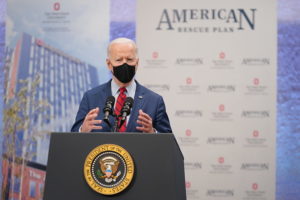
President Joe Biden delivers remarks on the anniversary of the Affordable Care Act Tuesday, March 23, 2021, at the Arthur James Cancer Hospital and the Richard Solove Research Institute in Columbus, Ohio. (Official White House Photo by Adam Schultz)
The problems plaguing roads, bridges, subways, and airports are mostly caused by a lack of political will at the local level. No amount of federal money can fix those problems, and will probably only make them worse by insulating the inept local politicians from the problems they have created.
Joe Biden’s massive infrastructure plan (which spends much of its funds on nearly everything but infrastructure) is a corporate giveaway to green energy lobbyists and a backdoor bailout for underperforming Democratic governors who have treated their citizens like a piggy-bank. Is it any wonder down-ballot races were a disaster for Democrats in 2020?
At the Cato Institute, Chris Edwards explains much of what is wrong with Biden’s infrastructure plan, writing:
Here are 10 ways that the Biden infrastructure approach is misguided.
Tax Hike Damage. About 65% of America’s infrastructure is owned by the private sector — everything from broadband to pipelines to the electric grid. Biden proposes to raise corporate taxes by $2 trillion over 15 years to fund his infrastructure plan, but that would suppress investment in private infrastructure by reducing after‐tax returns.
Not Needed. Most of Biden’s infrastructure spending would be for facilities owned by the states and private sector. But the states can fund their own infrastructure — for example, more than half the states have raised their own gas taxes to fund transportation since 2015. Subsidies to private infrastructure is also not needed, such as Biden’s $174 billion for electric vehicles. Car companies are already pumping billions of dollars into EVs, and there are already 30,000 EV charging stations across the nation.
Corporate Welfare. During the presidential campaign, Biden said, “we do not reward corporations, we reward individuals,” and he complained about “trickle‐down economics that works for corporate executives and Wall Street investors, but not working families.” But Biden’s own plan includes hundreds of billions of dollars in business subsidies — for EVs, broadband, manufacturing and utilities. If passed, the subsidies would add to the feeding frenzy of corporate lobbying in Washington.
Not Green. Biden’s infrastructure plan is supposed to help mitigate climate change, but the green way to fund infrastructure is user charges that restrain consumer demand. Gas taxes restrain automobile use; water charges restrain water use; and airport charges restrain airline use. But Biden’s plan includes new subsidies for automobiles, water systems, airports and other facilities funded by income taxes, not by pro‐environment user charges.
Cost Increase. The regulations tied to federal infrastructure projects raise costs and result in taxpayers getting less bang for the buck. For example, union‐backed Davis‐Bacon rules raise wage costs on federally funded highway projects by about 20%. The president would raise costs further by tying “project labor agreements” to infrastructure projects, which means collective bargaining, union benefits, and union work rules.
Wasteful Spending. State and local governments are often spendthrift when the federal government is paying the bills, as is evident by frequent cost overruns on federally funded infrastructure projects. Biden’s gusher of new subsidies would induce more waste. Furthermore, federal aid tends to be allocated based on politics, not economics. Much Amtrak investment, for example, goes to low‐density parts of the country where passenger rail makes little sense because every senator wants passenger rail in their state.
Policy Distortion. Federal subsidies distort state and local investment choices. In recent decades, for example, federal transit subsidies have induced dozens of cities to install costly light rail systems, even though bus systems are cheaper and more flexible. Similarly, federal subsidies helped induce California to spend on a boondoggle high‐speed rail line to nowhere in the middle of the state. Biden would double down on misguided rail subsidies.
Bureaucracy. Dependence on federal aid causes delays in projects, such as seaport expansions, as state officials wait years to receive federal funding. Then, after aid is received, federal bureaucracy can stretch out project completion times. Biden wants America to outcompete China on EVs, but his subsidies could tie U.S. carmakers in regulatory knots and steer their efforts in the wrong direction.
Bridges Not Crumbling. Politicians often claim that our infrastructure is crumbling, but much of it is in pretty good shape. The surface quality of the interstate highway system has improved over the decades, and the share of the nation’s highway bridges that are structurally deficient fell from 22% in 1992 to 9% in 2017. Some government infrastructure is in bad shape, such as the New York and Washington D.C. subway systems. But the problem in those cities is that managers ignored routine maintenance for many years.
Discourages Reforms. Federal infrastructure subsidies discourage the states from moving facilities to the private sector where they would be better managed. Biden would increase subsidies to airports, for example, but airports do not need subsidies. Many European airports have been privatized and are self‐funded through user charges and commercial revenues.
America doesn’t need to have its wealth inefficiently redistributed from the top down. It needs local leaders who will give their citizens the tools and freedom they need to succeed. No one in Joe Biden’s administration should be allocating money to paint over graffiti in the NYC subway. That should be handled by the city’s own government.
Action Line: Overwhelming federal government power brings with it overwhelming corporate cronyism. The federal government should focus on empowering states. The states of America’s growth corridors have already taken their future into their own hands and put forward policies focused on supporting their families and small businesses. That’s where you want to go if you want to look for a better America or to find liberty in retirement.
Originally posted on Your Survival Guy.
